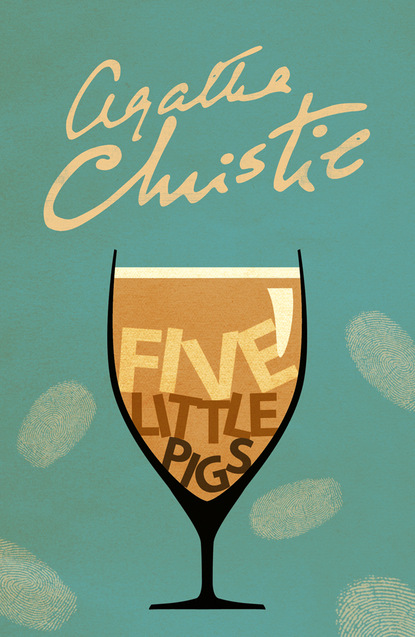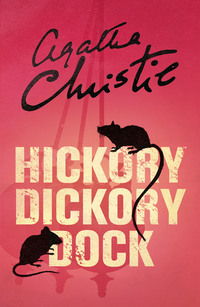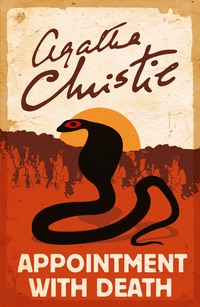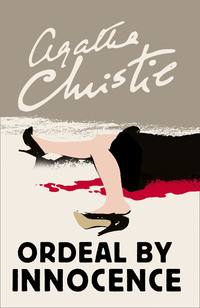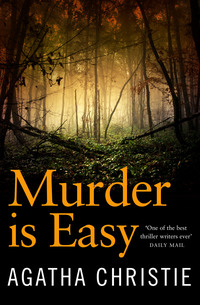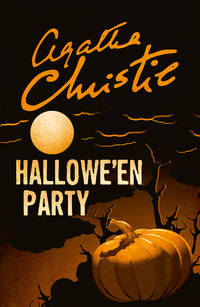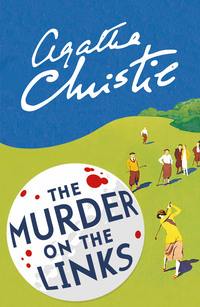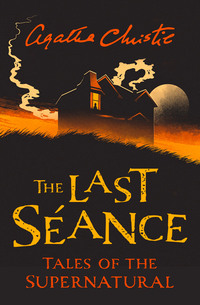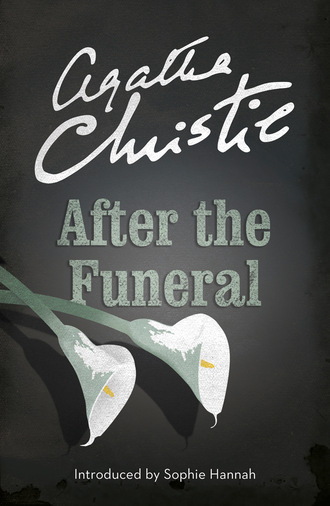
Полная версия
After the Funeral
‘She said nothing else that you can remember specially?’
‘She had no premonition, Mr Entwhistle, if that is what you mean. I’m sure of that. She was really, you know, in remarkably good spirits – apart from tiredness and the – the sad occasion. She asked me how I’d like to go to Capri. To Capri! Of course I said it would be too wonderful – it’s a thing I’d never dreamed I’d ever do – and she said, “We’ll go!” Just like that. I gathered – of course it wasn’t actually mentioned – that her brother had left her an annuity or something of the kind.’
Mr Entwhistle nodded. ‘Poor dear. Well, I’m glad she had the pleasure of planning – at all events.’ Miss Gilchrist sighed and murmured wistfully, ‘I don’t suppose I shall ever go to Capri now . . .’
‘And the next morning?’ Mr Entwhistle prompted, oblivious of Miss Gilchrist’s disappointments.
‘The next morning Mrs Lansquenet wasn’t at all well. Really, she looked dreadful. She’d hardly slept at all, she told me. Nightmares. “It’s because you were overtired yesterday,” I told her, and she said maybe it was. She had her breakfast in bed, and she didn’t get up all the morning, but at lunch-time she told me that she still hadn’t been able to sleep. “I feel so restless,” she said. “I keep thinking of things and wondering.” And then she said she’d take some sleeping tablets and try and get a good sleep in the afternoon. And she wanted me to go over by bus to Reading and change her two library books, because she’d finished them both on the train journey and she hadn’t got anything to read. Usually two books lasted her nearly a week. So I went off just after two and that – and that – was the last time –’ Miss Gilchrist began to sniff. ‘She must have been asleep, you know. She wouldn’t have heard anything and the Inspector assures me that she didn’t suffer . . . He thinks the first blow killed her. Oh dear, it makes me quite sick even to think of it!’
‘Please, please. I’ve no wish to take you any further over what happened. All I wanted was to hear what you could tell me about Mrs Lansquenet before the tragedy.’
‘Very natural, I’m sure. Do tell her relations that apart from having such a bad night she was really very happy and looking forward to the future.’
Mr Entwhistle paused before asking his next question. He wanted to be careful not to lead the witness.
‘She did not mention any of her relations in particular?’
‘No, no, I don’t think so.’ Miss Gilchrist considered. ‘Except what she said about being sorry not to see her brother Timothy.’
‘She did not speak at all about her brother’s decease? The – er – cause of it? Anything like that?’
‘No.’
There was no sign of alertness in Miss Gilchrist’s face. Mr Entwhistle felt certain there would have been if Cora had plumped out her verdict of murder.
‘He’d been ill for some time, I think,’ said Miss Gilchrist vaguely, ‘though I must say I was surprised to hear it. He looked so very vigorous.’
Mr Entwhistle said quickly:
‘You saw him – when?’
‘When he came down here to see Mrs Lansquenet. Let me see – that was about three weeks ago.’
‘Did he stay here?’
‘Oh – no – just came for luncheon. It was quite a surprise. Mrs Lansquenet hadn’t expected him. I gather there had been some family disagreement. She hadn’t seen him for years, she told me.’
‘Yes, that is so.’
‘It quite upset her – seeing him again – and probably realizing how ill he was –’
‘She knew he was ill?’
‘Oh yes, I remember quite well. Because I wondered – only in my own mind, you understand – if perhaps Mr Abernethie might be suffering from softening of the brain. An aunt of mine –’
Mr Entwhistle deftly side-tracked the aunt. ‘Something Mrs Lansquenet said caused you to think of softening of the brain?’
‘Yes. Mrs Lansquenet said something like “Poor Richard. Mortimer’s death must have aged him a lot. He sounds quite senile. All these fancies about persecution and that someone is poisoning him. Old people get like that.” And of course, as I knew, that is only too true. This aunt that I was telling you about – was convinced the servants were trying to poison her in her food and at last would eat only boiled eggs – because, she said, you couldn’t get inside a boiled egg to poison it. We humoured her, but if it had been nowadays I don’t know what we should have done. With eggs so scarce and mostly foreign at that, so that boiling is always risky.’
Mr Entwhistle listened to the saga of Miss Gilchrist’s aunt with deaf ears. He was very much disturbed.
He said at last, when Miss Gilchrist had twittered into silence:
‘I suppose Mrs Lansquenet didn’t take all this too seriously?’
‘Oh no, Mr Entwhistle, she quite understood.’
Mr Entwhistle found that remark disturbing too, though not quite in the sense in which Miss Gilchrist had used it.
Had Cora Lansquenet understood? Not then, perhaps, but later. Had she understood only too well?
Mr Entwhistle knew that there had been no senility about Richard Abernethie. Richard had been in full possession of his faculties. He was not the man to have persecution mania in any form. He was, as he always had been, a hard-headed business man – and his illness made no difference in that respect.
It seemed extraordinary that he should have spoken to his sister in the terms that he had. But perhaps Cora, with her odd childlike shrewdness, had read between the lines, and had crossed the t’s and dotted the i’s of what Richard Abernethie had actually said.
In most ways, thought Mr Entwhistle, Cora had been a complete fool. She had no judgement, no balance, and a crude childish point of view, but she had also the child’s uncanny knack of sometimes hitting the nail on the head in a way that seemed quite startling.
Mr Entwhistle left it at that. Miss Gilchrist, he thought, knew no more than she had told him. He asked whether she knew if Cora Lansquenet had left a will. Miss Gilchrist replied promptly that Mrs Lansquenet’s will was at the Bank.
With that and after making certain further arrangements he took his leave. He insisted on Miss Gilchrist’s accepting a small sum in cash to defray present expenses and told her he would communicate with her again, and in the meantime he would be grateful if she would stay on at the cottage while she was looking about for a new post. That would be, Miss Gilchrist said, a great convenience and really she was not at all nervous.
He was unable to escape without being shown round the cottage by Miss Gilchrist, and introduced to various pictures by the late Pierre Lansquenet which were crowded into the small dining-room and which made Mr Entwhistle flinch – they were mostly nudes executed with a singular lack of draughtsmanship but with much fidelity to detail. He was also made to admire various small oil sketches of picturesque fishing ports done by Cora herself.
‘Polperro,’ said Miss Gilchrist proudly. ‘We were there last year and Mrs Lansquenet was delighted with its picturesqueness.’
Mr Entwhistle, viewing Polperro from the southwest, from the north-west, and presumably from the several other points of the compass, agreed that Mrs Lansquenet had certainly been enthusiastic.
‘Mrs Lansquenet promised to leave me her sketches,’ said Miss Gilchrist wistfully. ‘I admired them so much. One can really see the waves breaking in this one, can’t one? Even if she forgot, I might perhaps have just one as a souvenir, do you think?’
‘I’m sure that could be arranged,’ said Mr Entwhistle graciously.
He made a few further arrangements and then left to interview the Bank Manager and to have a further consultation with Inspector Morton.
Chapter 5
‘Worn out,’ that’s what you are,’ said Miss Entwhistle in the indignant and bullying tones adopted by devoted sisters towards brothers for whom they keep house. ‘You shouldn’t do it, at your age. What’s it all got to do with you, I’d like to know? You’ve retired, haven’t you?’
Mr Entwhistle said mildly that Richard Abernethie had been one of his oldest friends.
‘I dare say. But Richard Abernethie’s dead, isn’t he? So I see no reason for you to go mixing yourself up in things that are no concern of yours and catching your death of cold in these nasty draughty railway trains. And murder, too! I can’t see why they sent for you at all.’
‘They communicated with me because there was a letter in the cottage signed by me, telling Cora the arrangements for the funeral.’
‘Funerals! One funeral after another, and that reminds me. Another of these precious Abernethies has been ringing you up – Timothy, I think he said. From somewhere in Yorkshire – and that’s about a funeral, too! Said he’d ring again later.’
A personal call for Mr Entwhistle came through that evening. Taking it, he heard Maude Abernethie’s voice at the other end.
‘Thank goodness I’ve got hold of you at last! Timothy has been in the most terrible state. This news about Cora has upset him dreadfully.’
‘Quite understandable,’ said Mr Entwhistle.
‘What did you say?’
‘I said it was quite understandable.’
‘I suppose so.’ Maude sounded more than doubtful. ‘Do you mean to say it was really murder?’
(‘It was murder, wasn’t it?’ Cora had said. But this time there was no hesitation about the answer.)
‘Yes, it was murder,’ said Mr Entwhistle.
‘And with a hatchet, so the papers say?’
‘Yes.’
‘It seems quite incredible to me,’ said Maude, ‘that Timothy’s sister – his own sister – can have been murdered with a hatchet!’
It seemed no less incredible to Mr Entwhistle. Timothy’s life was so remote from violence that even his relations, one felt, ought to be equally exempt.
‘I’m afraid one has to face the fact,’ said Mr Entwhistle mildly.
‘I am really very worried about Timothy. It’s so bad for him, all this! I’ve got him to bed now but he insists on my persuading you to come up and see him. He wants to know a hundred things – whether there will be an inquest, and who ought to attend, and how soon after that the funeral can take place, and where, and what funds there are, and if Cora expressed any wishes about being cremated or what, and if she left a will –’
Mr Entwhistle interrupted before the catalogue got too long.
‘There is a will, yes. She left Timothy her executor.’
‘Oh dear, I’m afraid Timothy can’t undertake anything –’
‘The firm will attend to all the necessary business. The will’s very simple. She left her own sketches and an amethyst brooch to her companion, Miss Gilchrist, and everything else to Susan.’
‘To Susan? Now I wonder why Susan? I don’t believe she ever saw Susan – not since she was a baby anyway.’
‘I imagine that it was because Susan was reported to have made a marriage not wholly pleasing to the family.’
Maude snorted.
‘Even Gregory is a great deal better than Pierre Lansquenet ever was! Of course marrying a man who serves in a shop would have been unheard of in my day – but a chemist’s shop is much better than a haberdasher’s – and at least Gregory seems quite respectable.’ She paused and added: ‘Does this mean that Susan gets the income Richard left to Cora?’
‘Oh no. The capital of that will be divided according to the instructions of Richard’s will. No, poor Cora had only a few hundred pounds and the furniture of her cottage to leave. When outstanding debts are paid and the furniture sold I doubt if the whole thing will amount to more than at most five hundred pounds.’ He went on: ‘There will have to be an inquest, of course. That is fixed for next Thursday. If Timothy is agreeable, we’ll send down young Lloyd to watch the proceedings on behalf of the family.’ He added apologetically: ‘I’m afraid it may attract some notoriety owing to the – er – circumstances.’
‘How very unpleasant! Have they caught the wretch who did it?’
‘Not yet.’
‘One of these dreadful half-baked young men who go about the country roving and murdering, I suppose. The police are so incompetent.’
‘No, no,’ said Mr Entwhistle. ‘The police are by no means incompetent. Don’t imagine that, for a moment.’
‘Well, it all seems to me quite extraordinary. And so bad for Timothy. I suppose you couldn’t possibly come down here, Mr Entwhistle? I should be most grateful if you could. I think Timothy’s mind might be set at rest if you were here to reassure him.’
Mr Entwhistle was silent for a moment. The invitation was not unwelcome.
‘There is something in what you say,’ he admitted. ‘And I shall need Timothy’s signature as executor to certain documents. Yes, I think it might be quite a good thing.’
‘That is splendid. I am so relieved. Tomorrow? And you’ll stay the night? The best train is the 11.20 from St Pancras.’
‘It will have to be an afternoon train, I’m afraid. I have,’ said Mr Entwhistle, ‘other business in the morning . . .’
II
George Crossfield greeted Mr Entwhistle heartily but with, perhaps, just a shade of surprise.
Mr Entwhistle said, in an explanatory way, although it really explained nothing:
‘I’ve just come up from Lytchett St Mary.’
‘Then it really was Aunt Cora? I read about it in the papers and I just couldn’t believe it. I thought it must be someone of the same name.’
‘Lansquenet is not a common name.’
‘No, of course it isn’t. I suppose there is a natural aversion to believing that anyone of one’s own family can be murdered. Sounds to me rather like that case last month on Dartmoor.’
‘Does it?’
‘Yes. Same circumstances. Cottage in a lonely position. Two elderly women living together. Amount of cash taken really quite pitifully inadequate one would think.’
‘The value of money is always relative,’ said Mr Entwhistle. ‘It is the need that counts.’
‘Yes – yes, I suppose you’re right.’
‘If you need ten pounds desperately – then fifteen is more than adequate. And inversely so. If your need is for a hundred pounds, forty-five would be worse than useless. And if it’s thousands you need, then hundreds are not enough.’
George said with a sudden flicker of the eyes: ‘I’d say any money came in useful these days. Everyone’s hard up.’
‘But not desperate,’ Mr Entwhistle pointed out. ‘It’s the desperation that counts.’
‘Are you thinking of something in particular?’
‘Oh no, not at all.’ He paused then went on: ‘It will be a little time before the estate is settled; would it be convenient for you to have an advance?’
‘As a matter of fact, I was going to raise the subject. However, I saw the Bank this morning and referred them to you and they were quite obliging about an overdraft.’
Again there came that flicker in George’s eyes, and Mr Entwhistle, from the depths of his experience, recognized it. George, he felt certain, had been, if not desperate, then in very sore straits for money. He knew at that moment, what he had felt subconsciously all along, that in money matters he would not trust George. He wondered if old Richard Abernethie, who also had had great experience in judging men, had felt that. Mr Entwhistle was also sure that after Mortimer’s death, Abernethie had formed the intention of making George his heir. George was not an Abernethie, but he was the only male of the younger generation. He was the natural successor to Mortimer. Richard Abernethie had sent for George, had had him staying in the house for some days. It seemed probable that at the end of the visit the older man had not found George satisfactory. Had he felt instinctively, as Mr Entwhistle felt, that George was not straight? George’s father, so the family had thought, had been a poor choice on Laura’s part. A stockbroker who had had other rather mysterious activities. George took after his father rather than after the Abernethies.
Perhaps misinterpreting the old lawyer’s silence, George said with an uneasy laugh:
‘Truth is, I’ve not been very lucky with my investments lately. I took a bit of a risk and it didn’t come off. More or less cleaned me out. But I’ll be able to recoup myself now. All one needs is a bit of capital. Ardens Consolidated are pretty good, don’t you think?’
Mr Entwhistle neither agreed nor dissented. He was wondering if by any chance George had been speculating with money that belonged to clients and not with his own? If George had been in danger of criminal prosecution –
Mr Entwhistle said precisely:
‘I tried to reach you the day after the funeral, but I suppose you weren’t in the office.’
‘Did you? They never told me. As a matter of fact, I thought I was entitled to a day off after the good news!’
‘The good news?’
George reddened.
‘Oh look here, I didn’t mean Uncle Richard’s death. But knowing you’ve come into money does give one a bit of a kick. One feels one must celebrate. As a matter of fact I went to Hurst Park. Backed two winners. It never rains but it pours! If your luck’s in, it’s in! Only a matter of fifty quid, but it all helps.’
‘Oh yes,’ said Mr Entwhistle. ‘It all helps. And there will now be an additional sum coming to you as a result of your Aunt Cora’s death.’
George looked concerned.
‘Poor old girl,’ he said. ‘It does seem rotten luck, doesn’t it? Probably just when she was all set to enjoy herself.’
‘Let us hope the police will find the person responsible for her death,’ said Mr Entwhistle.
‘I expect they’ll get him all right. They’re good, our police. They round up all the undesirables in the neighbourhood and go through ’em with a tooth comb – make them account for their actions at the time it happened.’
‘Not so easy if a little time has elapsed,’ said Mr Entwhistle. He gave a wintry little smile that indicated he was about to make a joke. ‘I myself was in Hatchard’s bookshop at 3.30 on the day in question. Should I remember that if I were questioned by the police in ten days’ time? I very much doubt it. And you, George, you were at Hurst Park. Would you remember which day you went to the races in – say – a month’s time?’
‘Oh I could fix it by the funeral – the day after.’
‘True – true. And then you backed a couple of winners. Another aid to memory. One seldom forgets the names of a horse on which one has won money. Which were they, by the way?’
‘Let me see. Gaymarck and Frogg II. Yes, I shan’t forget them in a hurry.’
Mr Entwhistle gave his dry little cackle of laughter and took his leave.
III
‘It’s lovely to see you, of course,’ said Rosamund without any marked enthusiasm. ‘But it’s frightfully early in the morning.’
She yawned heavily.
‘It’s eleven o’clock,’ said Mr Entwhistle.
Rosamund yawned again. She said apologetically:
‘We had the hell of a party last night. Far too much to drink. Michael’s got a terrible hangover still.’
Michael appeared at this moment, also yawning. He had a cup of black coffee in his hand and was wearing a very smart dressing-gown. He looked haggard and attractive – and his smile had the usual charm. Rosamund was wearing a black skirt, a rather dirty yellow pullover, and nothing else as far as Mr Entwhistle could judge.
The precise and fastidious lawyer did not approve at all of the young Shanes’ way of living. The rather ramshackle flat on the first floor of a Chelsea house – the bottles and glasses and cigarette ends that lay about in profusion – the stale air, and the general air of dust and dishevelment.
In the midst of this discouraging setting Rosamund and Michael bloomed with their wonderful good looks. They were certainly a very handsome couple and they seemed, Mr Entwhistle thought, very fond of each other. Rosamund was certainly adoringly fond of Michael.
‘Darling,’ she said. ‘Do you think just a teeny sip of champagne? Just to pull us together and toast the future. Oh, Mr Entwhistle, it really is the most marvellous luck Uncle Richard leaving us all that lovely money just now –’
Mr Entwhistle noted the quick, almost scowling, frown that Michael gave, but Rosamund went on serenely:
‘Because there’s the most wonderful chance of a play. Michael’s got an option on it. It’s a most wonderful part for him and even a small part for me, too. It’s about one of these young criminals, you know, they are really saints – it’s absolutely full of the latest modern ideas.’
‘So it would seem,’ said Mr Entwhistle stiffly.
‘He robs, you know, and he kills, and he’s hounded by the police and by society – and then in the end, he does a miracle.’
Mr Entwhistle sat in outraged silence. Pernicious nonsense these young fools talked! And wrote.
Not that Michael Shane was talking much. There was still a faint scowl on his face.
‘Mr Entwhistle doesn’t want to hear all our rhapsodies, Rosamund,’ he said. ‘Shut up for a bit and let him tell us why he’s come to see us.’
‘There are just one or two little matters to straighten out,’ said Mr Entwhistle. ‘I have just come back from Lytchett St Mary.’
‘Then it was Aunt Cora who was murdered? We saw it in the paper. And I said it must be because it’s a very uncommon name. Poor old Aunt Cora. I was looking at her at the funeral that day and thinking what a frump she was and that really one might as well be dead if one looked like that – and now she is dead. They absolutely wouldn’t believe it last night when I told them that that murder with the hatchet in the paper was actually my aunt! They just laughed, didn’t they, Michael?’
Michael Shane did not reply and Rosamund with every appearance of enjoyment said:
‘Two murders one after another. It’s almost too much, isn’t it?’
‘Don’t be a fool, Rosamund, your Uncle Richard wasn’t murdered.’
‘Well, Cora thought he was.’
Mr Entwhistle intervened to ask:
‘You came back to London after the funeral, didn’t you?’
‘Yes, we came by the same train as you did.’
‘Of course . . . Of course. I ask because I tried to get hold of you,’ he shot a quick glance at the telephone – ‘on the following day – several times in fact, and couldn’t get an answer.’
‘Oh dear – I’m so sorry. What were we doing that day? The day before yesterday. We were here until about twelve, weren’t we? And then you went round to try and get hold of Rosenheim and you went on to lunch with Oscar and I went out to see if I could get some nylons and round the shops. I was to meet Janet but we missed each other. Yes, I had a lovely afternoon shopping – and then we dined at the Castile. We got back here about ten o’clock, I suppose.’
‘About that,’ said Michael. He was looking thoughtfully at Mr Entwhistle. ‘What did you want to get hold of us for, sir?’
‘Oh! Just some points that had arisen about Richard Abernethie’s estate – papers to sign – all that.’
Rosamund asked: ‘Do we get the money now, or not for ages?’
‘I’m afraid,’ said Mr Entwhistle, ‘that the law is prone to delays.’
‘But we can get an advance, can’t we?’ Rosamund looked alarmed. ‘Michael said we could. Actually it’s terribly important. Because of the play.’
Michael said pleasantly:
‘Oh, there’s no real hurry. It’s just a question of deciding whether or not to take up the option.’
‘It will be quite easy to advance you some money,’ said Mr Entwhistle. ‘As much as you need.’
‘Then that’s all right.’ Rosamund gave a sigh of relief. She added as an afterthought: ‘Did Aunt Cora leave any money?’
‘A little. She left it to your Cousin Susan.’
‘Why Susan, I should like to know! Is it much?’
‘A few hundred pounds and some furniture.’
‘Nice furniture?’
‘No,’ said Mr Entwhistle.
Rosamund lost interest. ‘It’s all very odd, isn’t it?’ she said. ‘There was Cora, after the funeral, suddenly coming out with “He was murdered!” and then, the very next day, she goes and gets herself murdered? I mean, it is odd, isn’t it?’




